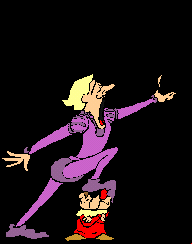516o20
'); })();
 |
|
El verbo 'To be' tiene una importancia especial en ingls. Se corresponde a los verbos espaoles "ser" y "estar". Dependiendo del sentido de la frase deduciremos de cual de los dos se trata.
| I am English / Soy ingls I am in England / Estoy en Inglaterra Tiene algunos usos especiales distintos a sus equivalentes espaoles. - Sirve para expresar la edad, en cuyo caso se traduce por 'tener': Mary is 20 years old / Maria tiene 20 aos - Para expresar las sensaciones tambin se emplea el verbo 'to be' y equivale al 'tener' espaol. Are you hungry? / Tienes hambre? - Tambin para hablar sobre el tiempo atmosfrico. En este caso se traduce por 'hacer' It's windy / Hace viento PRESENTE DE INDICATIVO |
| FORMA AFIRMATIVA | FORMA NEGATIVA | FORMA INTERROGATIVA |
| I am (I'm) | I am not (I'm not) | am I? |
| soy, estoy | no soy, no estoy | soy yo?, estoy yo? |
| you are (you're) | you are not (you're not) | are you? |
| eres, ests | no eres, no ests | eres t?, ests t? |
| he is (he's) | he is not (he's not) | is he? |
| l es, est | l no es, no est | es l?, est l? |
| we are (we're) | we are not (we're not) | are we? |
| somos, estamos | no somos, no estamos | somos?, estamos? |
| you are (you're) | you are not (you're not) | are you? |
| sois, estis | no sois, no estis | sois?, estis? |
| they are (they're) | they are not (they're not) | are they? |
| ellos son, estn | ellos no son, no estn | son, estn ellos? |
PRETERITO (se corresponde al pretrito indefinido y al pretrito imperfecto espaol)
| FORMA AFIRMATIVA | FORMA NEGATIVA | FORMA INTERROGATIVA |
| I was | I was not (I wasn't) | was I? |
| fui, era / estuve, estaba | no fui, no era / no estuve, no estaba | fui?, era? / estuve?, estaba? |
| you were | you were not (you weren't) | were you? |
| fuiste, eras / estuviste, estabas | no fuiste, no eras / no estuviste, no estabas | fuiste?, eras? / estuviste?, estabas? |
| he was | he was not (he wasn't) | was he? |
| fue, era / estuvo, estaba | no fue, no era / no estuvo, no estaba | fue?, era? / estuvo?. estaba? |
| we were | we were not (we weren't) | were we? |
| fuimos, ramos, / estuvimos, estbamos | no fuimos, no ramos, / no estuvimos, no estbamos | fuimos?, ramos? / estuvimos?, estbamos |
| you were | you were not (you weren't) | were you? |
| fuisteis, erais, / estuvisteis, estabais | no fuisteis, no erais / no estuvisteis, no estabais | fuisteis?, erais?, / estuvisteis?, estabais? |
| they were | they were not (they weren't) | were they? |
| fueron, eran / estuvieron, estaban | no fueron, no eran / no estuvieron, no estaban | fueron?, eran? / estuvieron?, estaban? |
En el Presente, las formas afirmativa y negativa se pueden contraer, mientras que en la forma interrogativa no. En el pretrito solamente la forma negativa puede contraerse.
Las formas contraidas suelen utilizarse en la conversacin, pero no se usan de forma escrita salvo cuando el propio escrito tiene un carcter informal o refleja una conversacin.
TO BE + INFINITIVO
Cuando al verbo 'to be' le sigue un infinitivo adquiere una importancia especial:
- Es una forma de dar instrucciones u rdenes de manera impersonal.
She is to stay here till we return / Ella debe quedarse aqu hasta que volvamos
(en lugar de 'She must stay....')
- Sirve para establecer un plan
She is to be married next year / Ella va a casarse el ao prximo
TO BE + GOING TO
Expresa una forma de futuro. Equivale a las expresiones espaolas "ir a..., estar punto de... tener la intencin de..., etc."
We are going to the theatre tonight / Vamos al teatro esta noche![]()
![]()
I am going to travel to Buenos Aires next Monday / Tengo la intencin de viajar a Buenos Aires el prximo lunes.
![]()
*Tambin te puede interesar:
La Mansin del Ingls. https://mansioningles.descargarjuegos.org
Copyright La Mansin del Ingls C.B. - Todos los Derechos Reservados . -
Cmo puedo desactivar el bloqueo de anuncios en La Mansin del Ingls?


